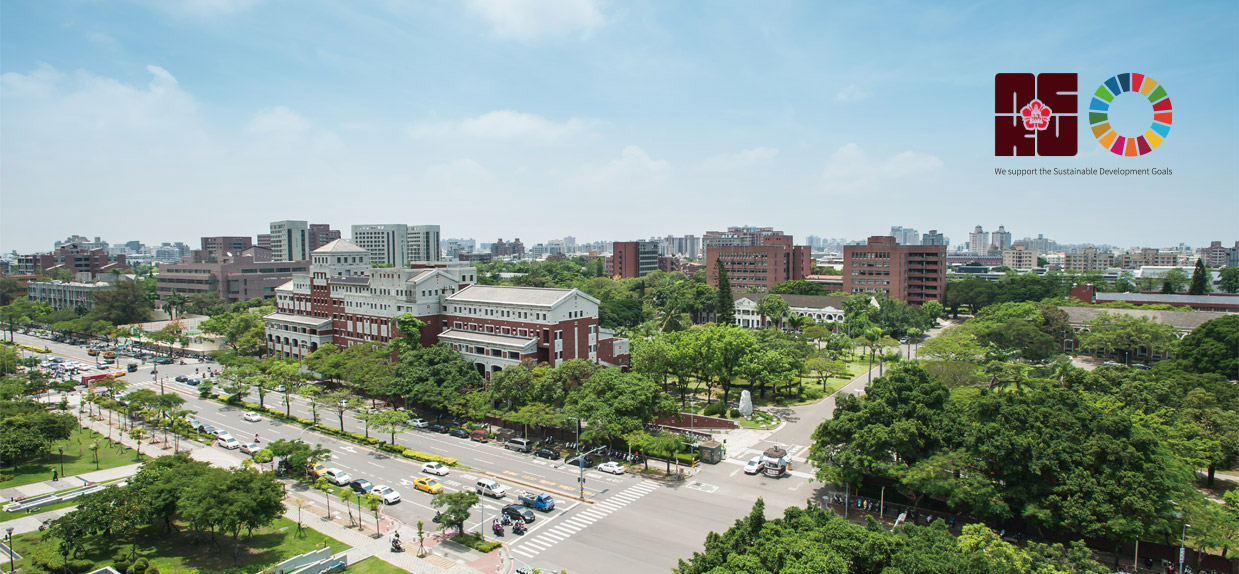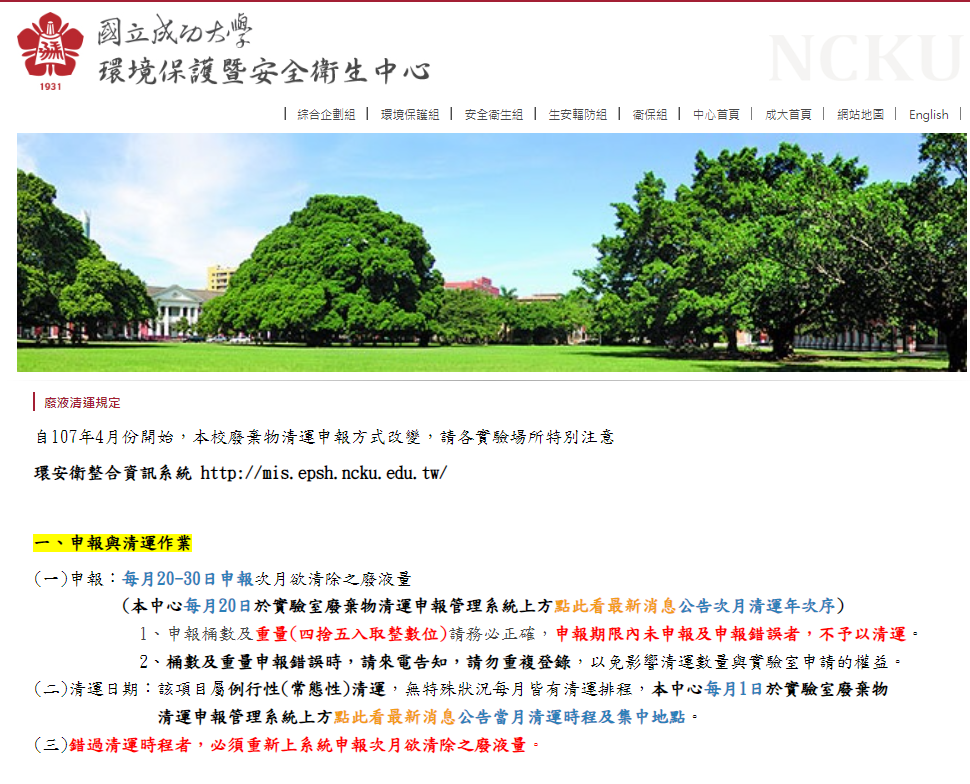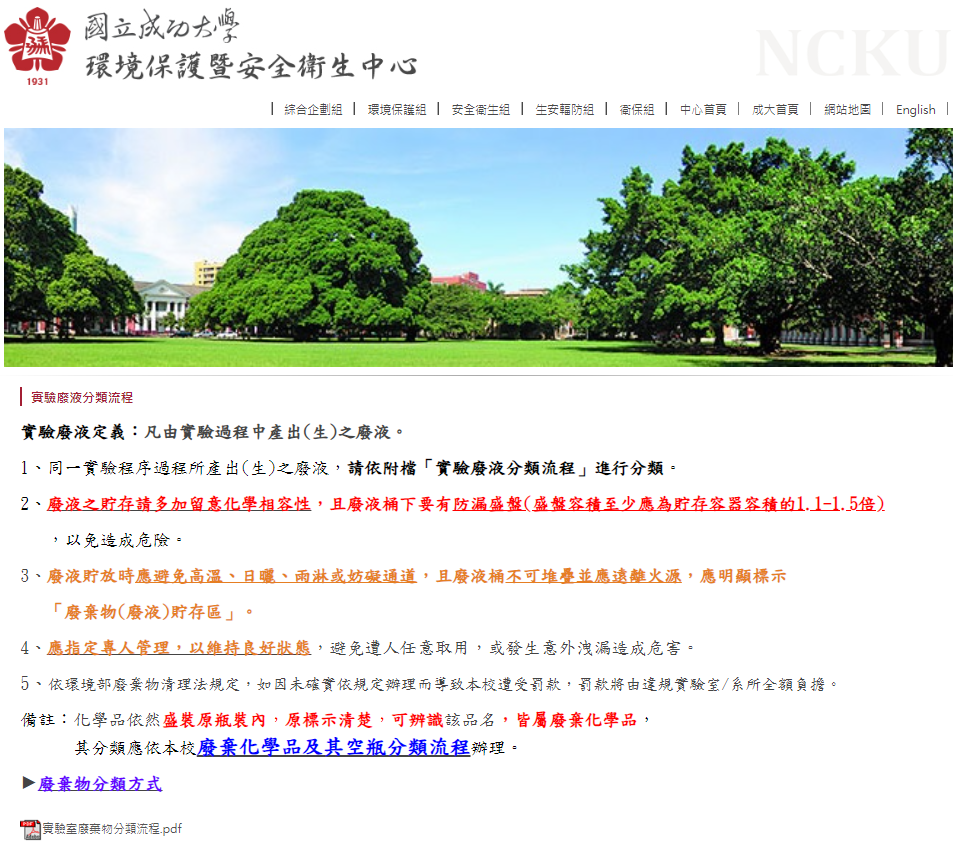
Water discharge guidelines and standards

NCKU's water discharge guidelines and standards
The National Cheng Kung University(NCKU) Center for Occupational Safety and Environmental Protection (EPSH) has issued regulations and procedures for wastewater management, aiming to standardize the handling of wastewater in campus buildings and laboratories and ensure that discharged water meets relevant standards and guidelines. The regulations clearly define the responsibilities of each unit, requiring that wastewater be collected, classified, stored, and treated according to prescribed procedures. This initiative not only reduces the risk of harmful substances polluting water bodies but also strengthens environmental awareness on campus and promotes the practice of sustainable development.
To further strengthen wastewater management, the EPSH Center also issued the “Laboratory Wastewater Classification Steps,” providing laboratory personnel with clear operational guidelines. The guidelines detail the classification standards and treatment methods for different types of wastewater, distinguishing them based on factors such as pH, toxicity, and flammability to ensure that each type is properly handled. By following these specific classification steps, laboratories can effectively reduce the potential environmental hazards of wastewater, enhance overall environmental management efficiency.
- Waste liquid removal regulations, published by Center for Occupational Safety and Health and Environmental Protection
 The NCKU Center for Occupational Safety and Environmental Protection (EPSH) has issued regulations and procedures for wastewater management, aiming to standardize the handling of wastewater in campus buildings and laboratories and ensure that discharged water meets relevant standards and guidelines. The regulations clearly define the responsibilities of each unit, requiring that wastewater be collected, classified, stored, and treated according to prescribed procedures.This initiative not only reduces the risk of harmful substances polluting water bodies but also strengthens environmental awareness on campus and promotes the practice of sustainable development.
The NCKU Center for Occupational Safety and Environmental Protection (EPSH) has issued regulations and procedures for wastewater management, aiming to standardize the handling of wastewater in campus buildings and laboratories and ensure that discharged water meets relevant standards and guidelines. The regulations clearly define the responsibilities of each unit, requiring that wastewater be collected, classified, stored, and treated according to prescribed procedures.This initiative not only reduces the risk of harmful substances polluting water bodies but also strengthens environmental awareness on campus and promotes the practice of sustainable development.- Waste liquid classification steps of laboratory, published by Center for Occupational Safety and Health and Environmental Protection
 To further strengthen wastewater management, the EPSH Center also issued the “Laboratory Wastewater Classification Steps,” providing laboratory personnel with clear operational guidelines. The guidelines detail the classification standards and treatment methods for different types of wastewater, distinguishing them based on factors such as pH, toxicity, and flammability to ensure that each type is properly handled. By following these specific classification steps, laboratories can effectively reduce the potential environmental hazards of wastewater, enhance overall environmental management efficiency.
To further strengthen wastewater management, the EPSH Center also issued the “Laboratory Wastewater Classification Steps,” providing laboratory personnel with clear operational guidelines. The guidelines detail the classification standards and treatment methods for different types of wastewater, distinguishing them based on factors such as pH, toxicity, and flammability to ensure that each type is properly handled. By following these specific classification steps, laboratories can effectively reduce the potential environmental hazards of wastewater, enhance overall environmental management efficiency.
- NCKU Sustainable Development Planning for Recycled Water Treatment
 The “Sustainable Planning for Reclaimed Water Treatment” project at the Hydraulics Laboratory of National Cheng Kung University emphasizes that reclaimed water is a key component in Taiwan’s diversified water source strategy. The quality of effluent from wastewater treatment plants critically affects the efficiency and cost of reclaimed water. The research team focuses on optimizing aeration systems and blowers in aeration tanks, conducting flow-field measurements, CFD simulation, and oxygen transfer efficiency testing. They developed an underwater PIV imaging measurement system and adopted IoT technologies for real-time dissolved oxygen monitoring. The aim is to balance energy savings and effective biochemical treatment to drive sustainable development of reclaimed water technologies in Taiwan.
The “Sustainable Planning for Reclaimed Water Treatment” project at the Hydraulics Laboratory of National Cheng Kung University emphasizes that reclaimed water is a key component in Taiwan’s diversified water source strategy. The quality of effluent from wastewater treatment plants critically affects the efficiency and cost of reclaimed water. The research team focuses on optimizing aeration systems and blowers in aeration tanks, conducting flow-field measurements, CFD simulation, and oxygen transfer efficiency testing. They developed an underwater PIV imaging measurement system and adopted IoT technologies for real-time dissolved oxygen monitoring. The aim is to balance energy savings and effective biochemical treatment to drive sustainable development of reclaimed water technologies in Taiwan.
